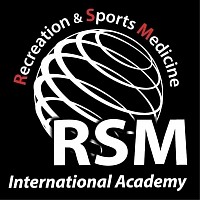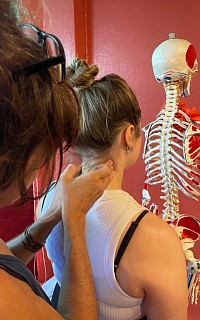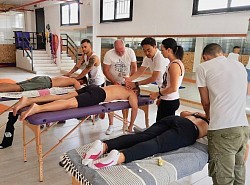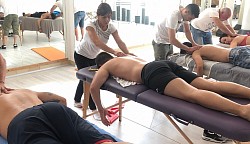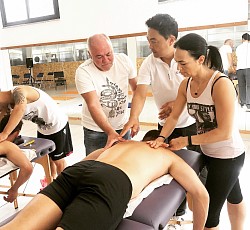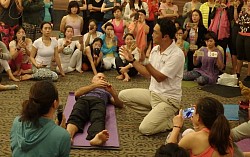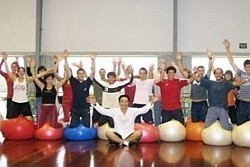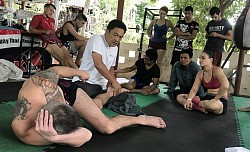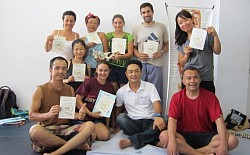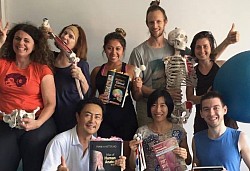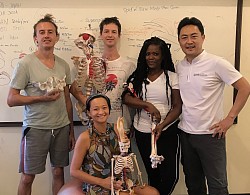FAQs about Postural Massage Courses
Massage Courses and FAQs
You'll find a comprehensive list of FAQs related to RSM International Academy courses. By exploring these questions, you'll gain a better understanding of what we offer. For detailed insights on each course, please navigate to our individual course pages.
🔸 Our curriculum is centred on pain relief and postural massage, prominently featuring three main courses: Trigger Point Therapy, Deep Tissue Massage, and Myofascial Release combined with Stretching.
🔸 Additionally, we provide specialized private courses tailored to all levels. Delve into our offerings and select the best course that aligns with your aspirations. We pride ourselves on providing professionally designed topics and lessons, crafted to meet diverse needs.
How can I enroll in RSM International Academy courses?
To enroll, please visit our Course Enrollment Page or contact us directly via WhatsApp, Line, email or phone. We offer a range of courses, including sports medicine massage, trigger point therapy, and kinetic chain analysis. If you’re a beginner, we recommend starting with Trigger Point Therapy or Functional Anatomy and Clinical Palpation. These courses are designed for both beginners and experienced professionals, including physicians and physiotherapists.
For advanced students or those with a solid foundation, our Deep Tissue Massage or Dynamic Myofascial Release courses are ideal for refining your skills. Please note that certain advanced courses, such as Dynamic Myofascial Release, are intended for licensed professionals or those with at least two years of experience in the field. A strong understanding of anatomy is required to ensure the best learning outcomes and avoid disrupting other students.
Once you have chosen your course, proceed with the payment instructions provided on the enrollment page. Upon completion, you will receive a confirmation of your participation. Please be aware that we do not accept competitors or unauthorized individuals attempting to disrupt classes. Recording of lessons is strictly prohibited, and any such actions will result in immediate dismissal from the course.
We encourage you to check the schedule and secure your spot at least a month in advance to ensure availability.
I am an experienced massager and do trigger point therapy and deep tissue massage. Is there anything new I can learn at RSM?
At RSM, we offer massage courses focusing on pain relief and posture improvement from a sports medicine perspective. Our course content diverges significantly from other massage schools. With over 25 years of specialization in pain relief and posture improvement within sports medicine, I've observed a common challenge among massage therapists: many struggle to effectively integrate their understanding of functional anatomy into their practice. This often arises from a lack of familiarity with underlying functional anatomy and its role in mitigating pain and correcting posture, as well as deficiencies in palpation techniques.
Complementing your extensive experience, our curriculum emphasizes three key areas: trigger point therapy for pain relief, deep tissue massage for posture correction, and dynamic myofascial release for enhancing dynamic postural stability. Our approach prioritizes not just executing massage routines, but accurately assessing conditions—such as muscle tension, trigger points, and fascial distortions—via palpation techniques, and tailoring massages accordingly to alleviate pain and enhance posture. RSM's massage courses are designed to equip you with the knowledge and skills to apply functional anatomy effectively in your massages, yielding optimal outcomes and refining your massage techniques for practical success.
For instance, RSM's massage courses attract a diverse range of medical professionals worldwide, including doctors, physiotherapists, licensed massage therapists, judo therapists, acupuncturists, as well as beginners seeking to enhance their palpation techniques and refine their massage practices. Learning palpation techniques under expert guidance is crucial, as it minimizes time spent on trial and error and allows for significant improvement in technique in a short period of time. Our unique palpation techniques facilitate early detection of latent trigger points, muscle tension, and fascial distortion, enabling targeted massages to alleviate pain and improve posture. By combining your existing techniques with RSM's three main courses—Trigger Point Therapy, Deep Tissue Massage and Dynamic Myofascial Release —you can achieve unprecedented results.
Moreover, RSM's dynamic myofascial release techniques are particularly effective for elders dynamic postural stability, rehabilitation for functionalization by activating proprioceptors, conditioning professional athletes to avoid injury and enhance performance, and facilitating rehabilitation for older adults. By integrating trigger point therapy and deep tissue massage to address posture issues arising from fascial distortion, enhancing nerve gliding, releasing joint capsules, and improving proprioceptive function, our massages cater to diverse client needs. As an experienced professional, you also have the option to take Private Massage Training tailored to your specific interests.
Our personalized massage training format enhances your palpation skills and provides immediate feedback to refine techniques crucial for pain reduction and posture improvement. The techniques learned at RSM are honed through practice, enabling you to acquire skills that yield tangible results swiftly.
I am considering a career change to be a massage therapist. I have no prior experience and I’m not very young. Is it possible?
With significant advancements in technology, particularly in the realms of the internet and AI, individuals worldwide are exploring new career avenues, with many considering adding massage therapy to their professional skill set. As an esteemed international academy, RSM warmly welcomes anyone with an interest in pursuing a career in massage therapy. Our courses are meticulously designed to equip students with practical massage skills aligned with professional standards, including trigger point therapy, deep tissue massage, and dynamic myofascial release, all with a focus on pain relief and posture improvement. Our curriculum caters to learners at all levels, from novice enthusiasts to seasoned practitioners seeking to enhance their expertise.
Whether you are embarking on a new journey or simply curious, RSM recommends commencing your learning with our Trigger Point Therapy course for pain relief. Led by renowned expert Hironori Ikeda, this condensed 20-hour course over 5 days focuses on palpation techniques crucial for massage therapy and effective pain relief. However, achieving professional proficiency requires a comprehensive understanding of various aspects, including functional anatomy, palpation techniques, trigger points, muscle tension, nerve entrapment, stretching, and joint capsule mobility. While years of experience are typically necessary to apply pain relief and postural correction massage effectively, RSM's courses are structured to facilitate understanding even for beginners.
By establishing a solid foundation with us, you'll find it easier to comprehend learning materials in subsequent seminars and schools. You'll quickly discern the level of expertise of instructors and the effectiveness of their teachings. As a professional in this field, I can discern the level of experience and passion within seconds or with just a few touches. This acute understanding is invaluable in discerning genuine expertise from mere surface knowledge.
For optimal learning outcomes, RSM recommends completing our three core massage courses—Trigger Point Therapy, Deep Tissue Massage, and Dynamic Myofascial Release—within a concentrated 3-week timeframe, totaling 60 hours of intensive study. Additionally, we suggest participating in 1-2 private massage training sessions, totaling either 7.5 hours or 15 hours, to further enhance your skills. This comprehensive training ensures superior proficiency compared to individuals practicing independently for years without a thorough grasp of anatomy. We strongly advise prospective students to explore other schools and compare course contents to align with their career aspirations.
Consider the success story of a 53-year-old Japanese woman who transitioned from product sales to massage therapy. After completing all three major RSM courses, including 15 hours of private lessons, she diligently studied and made notes for each lesson until midnight after each session. Upon completing her training, she launched her own massage business, attracting 7 to 12 clients per week within just 3 months through word-of-mouth referrals, even before establishing her website. Her rapid progress exemplifies the efficacy of RSM's practical approach to massage education.
RSM courses prioritize practical massage techniques and underlying principles to optimize learning efficiency. Small class sizes, limited to 7 students per class, ensure personalized attention and rapid skill development within a highly motivating environment.
If you are serious about pursuing a career in massage therapy, please explore all other massage schools, compare them, and choose the right fit for you. We prioritize the acquisition of practical skills, ensuring every moment spent in our courses contributes to your professional development. Please contact us at least 2 to 3 months before your desired registration date so we can adequately prepare you for your new career journey, providing comprehensive preparations and recommending some massage books to facilitate your learning process.
Upon completion of our courses and private lessons, equipped with the necessary skills and knowledge for massage service, RSM will provide personalized recommendations for potential employment opportunities in spas and service centers in your country. Many of our students have swiftly found employment using their RSM certificates and the skills acquired under Hironori's guidance.
Important Notice: Understanding the licenses and skill sets required for massage services in your specific location is crucial. Depending on the country, a license or accident insurance may be mandatory. While RSM courses do not confer government massage licenses, they provide practical skills and reliable massage techniques aligned with sports medicine standards. However, when offering massage services, it is imperative to adhere to state regulations.
What specific skills and knowledge can sports trainers gain from enrolling in RSM’s pain relief and postural correction massage?
In the field of sports training, there is a growing demand for trainers who possess a wide range of skills beyond traditional techniques. With information on training methods readily available on platforms like YouTube, each sports trainer is expected to have personalized knowledge and skills. In response to this dramatic shift, many sports trainers are turning their attention to RSM's massage courses, which specialize in pain relief and posture improvement. Led by Hironori Ikeda, MSc in Sports Medicine, these courses focus on three primary techniques: trigger point therapy, deep tissue massage, and dynamic myofascial release, approached from a sports medicine perspective. As a result, trainers can acquire these skills relatively smoothly.
Clients today not only seek to improve muscle strength and performance but also emphasize the integration of pain relief and posture correction into their training. Intensive training or bodybuilding can lead to issues such as joint pain, trigger points, muscle tension, and myofascial strain, affecting performance and potentially causing injuries. There is a growing need for genuine sports trainers who can address pain relief and posture improvement through massage and stretching before such issues arise. With AI customizing training menus, the demand for advanced massage skills focused on pain relief and correcting posture and movement to complement physical training is further increasing.
Employers seek trainers who possess skills in sports massage, pain relief, and posture correction techniques, alongside traditional sports training knowledge. Additionally, as trainers age, clients often prefer care from someone of a similar age, highlighting the importance of gradually shifting focus towards massage skills for pain relief and posture correction. Especially for young female trainers or those with excellent physical appearance, popularity may decline with age, emphasizing the need to prepare for one's future by focusing on massage skills for pain relief and posture correction.
RSM's curriculum covers posture assessment, identifying causes of pain, precise palpation techniques, alleviating muscle tension and trigger points, addressing postural issues stemming from myofascial strain, and managing pain caused by nerve compression, all supported by evidence from sports medicine.
Upon completing the three main courses, participants can acquire advanced techniques and superior palpation skills by taking private massage training courses or sports massage courses. Sports massage includes various types tailored to clients' conditioning, such as pre-match, post-match, performance enhancement, and injury prevention massages. While these main massage courses cover much of this, learning how to adapt massage skills to individual training and client needs can be achieved through private lessons.
RSM's targeted training expands sports trainers' capabilities to serve a diverse clientele, significantly enhancing their professional standing in the wellness sector. Private courses equip trainers with hands-on massage skills to upgrade their service offerings. Enhancing palpation techniques through essential massage courses and private lessons is a reliable method to fast-track professional growth, facilitating the mastery of robust techniques.
Therefore, if you aspire to provide superior services in the field of sports training, combining RSM's three main massage courses with private lessons or sports massage courses presents an excellent opportunity to do so. This practical massage skill set will surely accelerate your growth in the field. Even as you get older, you will have a wider chance to grasp and contribute to the profession.
As a Yoga/Pilates Instructor, what benefits can I gain from enrolling in RSM’s pain relief and postural massage courses?
As online access to yoga and Pilates information becomes increasingly convenient, students' expectations of yoga and Pilates instructors are dramatically evolving. They now seek personalized care, demanding a deeper understanding of their bodies, including the root causes of pain and methods for correcting posture. With a significant shift towards a holistic approach that encompasses both mental and physical well-being, instructors in the YOGA/Pilates field require specialized knowledge and skills, such as massage techniques for pain relief and posture improvement, to stand out from others. These massage skills are unique and cannot be provided by growing digital platforms like YouTube channels and yoga apps.
RSM's specialized training in sports medicine for pain relief and posture improvement is perfectly aligned with integrating therapeutic massage into YOGA/Pilates practice, focusing on essential techniques such as trigger point therapy, deep tissue massage, and dynamic myofascial release. Mastering practical massage techniques along with theory in a short period and integrating them into your YOGA/Pilates practice will enhance your profession to better meet clients' demands. Additionally, RSM offers recommended options such as the Dynamic Myofascial Release Course. In this format, various yoga postural stretching techniques are applied to understand clients' body imbalances and correct them properly. By acquiring solid massage skills based on sports medicine principles, instructors can bridge the gap between theory and practice, offering personalized attention tailored to their clients' specific needs. This approach not only meets the increasing demand for customized massage sessions but also distinguishes instructors as leaders in the digital realm.
Our courses aim to enhance YOGA/Pilates instructors' ability to conduct posture assessments, identify causes of pain, apply precise palpation techniques, alleviate muscle tension and trigger points, and address issues arising from fascial distortion. This comprehensive skill set enhances instructors' capacity to provide a holistic service that considers both the physical and mental aspects of yoga and Pilates.
RSM's targeted training significantly expands the abilities of YOGA/Pilates instructors to provide a more personalized, informed approach to their clients, greatly enhancing their professional standing in the wellness industry. Integrating specialized massage skills into their yoga/Pilates offerings will significantly enhance their value.
I am a yoga and Pilates instructor providing relaxation massage. I want to start with Dynamic Myofascial Release. Possible?
The Dynamic Myofascial Release Course at RSM International Academy is an advanced training program designed to integrate Trigger Point Therapy and Deep Tissue Massage to improve posture, pain relief, rehabilitation, and sports performance. This program is specially tailored for medical professionals, physiotherapists, massage therapists, sports trainers, yoga and Pilates instructors, who have at least one year of hands-on professional massage experience.
The course is built upon two key therapeutic techniques. Trigger Point Therapy focuses on precise palpation and muscle release techniques to alleviate pain and tension caused by myofascial trigger points. This method requires a strong understanding of muscle pain patterns and their effects on the body. Deep Tissue Massage (DTM) targets deep muscle layers and connective tissues, particularly around the joints, to enhance posture, reduce pain, and improve range of motion. These techniques are essential for those working in rehabilitation and sports performance enhancement.
Since this course assumes a solid foundation in palpation skills and hands-on therapy, prior experience in Trigger Point Therapy and Deep Tissue Massage is strongly recommended. Without these essential skills, it may be difficult to keep up with the course structure, as the program is designed for professionals who already have practical experience.
Unlike general massage therapy courses, this program provides specialized therapeutic approaches that require a deep understanding of anatomy and clinical application skills. The training is not an entry-level program but is structured for healthcare professionals and experienced practitioners aiming to enhance their skills in postural correction, pain management, rehabilitation, and sports performance optimization.
For these reasons, joining the Dynamic Myofascial Release Course without prior training in Trigger Point Therapy or Deep Tissue Massage is not permitted. Even if one believes their skill level is high, the reality is that this course operates on a completely different level of discussion and practical application, making it difficult to keep up. Additionally, other students expect a smooth, high-level learning experience and do not wish to train with individuals who lack the necessary foundational knowledge. Many of our participants have expressed that they do not appreciate having course explanations repeatedly interrupted due to the presence of unprepared students.
Therefore, all participants must begin with Trigger Point Therapy or Deep Tissue Massage before progressing to Dynamic Myofascial Release. However, for those with exceptional palpation skills and a strong understanding of anatomy, starting directly with Deep Tissue Massage may be considered.
If none of these options are suitable due to time constraints, private lessons are available. However, these sessions are limited, and we appreciate your understanding regarding scheduling constraints.
